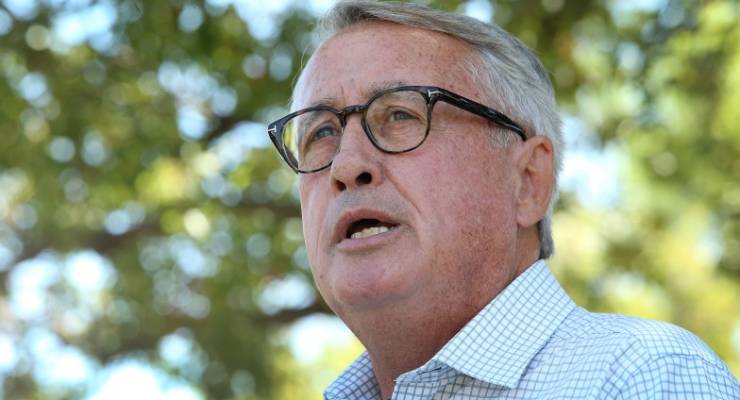
Wayne Swan has intervened in the foreign interference debate with a warning to intelligence agencies and the government to stop using the issue to attack Labor and instead aim to achieve a bipartisan approach to preventing foreign intervention in politics.
In a Facebook post this morning, Swan criticised “a series of leaks targeted at selected members of the Labor Party, which appear to have come from security agencies and others associated with an investigation ordered by the Prime Minister.” “It’s critical,” Swan says, “that the security agencies and the government get this discussion back onto a political framework that works in the interests of all Australians — not just the Liberal Party.”
Since the Dastyari scandal broke, it’s been clear that Australia’s security agencies have been ready to drop material about politicians’ and ex-politicians’ links with Chinese interests into the public domain as part of a campaign against Chinese influence. It has also been clear that the government — whatever the public interest in curbing the noxious influence of the China Lobby and Beijing’s proxies here — has been eager to use the issues to attack Labor.
Indeed, this morning, the government’s own exposure on China was again in the spotlight, with Defence Minister Marise Payne explicitly repudiating Trade minister Steve Ciobo at an estimates hearing. Questioned by Labor’s shadow foreign minister Penny Wong about Ciobo’s recent comments at odds with government policy on China, that China’s militarisation of the South China Sea was “a matter for China”, Payne said “no, it means the government is concerned about the militarisation of those features.” There also remain legitimate questions about the role of former journalist and, temporarily, adviser to Turnbull, John Garnaut, who seems to have miraculously transformed into an eminent national security figure on relations with China.
But the focus has primarily been on Labor, due to Bob Carr’s high-profile role as a lobbyist for better relations with Beijing tyranny, and suggestions of divisions within Labor about how to react to Andrew Hastie’s parliamentary comments about prolific bipartisan donor and Chinese billionaire Chau Chak Wing.
It remains the case that Labor tried to ban foreign donations in 2009, only to be stymied by the Coalition, before the Liberals discovered the virtues of that idea at about the same time as the Dastyari affair came to light, courtesy of drops from intelligence agencies. It was the Abbott government, via Trade Minister Andrew Robb (current Chinese company lobbyist), that negotiated a free trade agreement with China and excoriated Labor as Sinophobes for criticising aspects of it. It was the Turnbull government that sought, and failed, to pass an extradition treaty with the regime.
Swan’s comments, however, go beyond these issues to a more serious criticism that security agencies have been meddling in partisan politics, regardless of the culpability of individual Labor figures. They’re likely to prompt confected outrage from the government. It’s the Liberals, however, who’ve been happy to exploit the foreign interference issue for partisan ends while, like Labor, having plenty of exposure to the problem themselves.








It is really distressing that such a serious and necessary discussion about Chinese influence in Australia should be used as a internal political weapon. We all need to wake up and realize that China is incredibly resourceful and geopolitically intelligent. Take a read of Clive Hamilton’s book ‘Silent Invasion’ and an eye opener it is – the subtle influence that China in pursuing within Australian society is a little scary!!!
Hamilton’s objectivity needs to bad taken into account when reading his book
Excellent Bernard. and the dark heart of this story is the ramping of China Fear in the context of the imminent Foreign Donations Bill.
Its all about money in the end and both parties are caught in the proverbial cleft stick, that Faulkner tried to dig them out of a decade ago
This government and their media lackeys tried to whack Bob Carr over “too much Chinese influence in politics” over what they said he was doing in “getting Kenneally (then Kitching) to ask questions in Senate Estimates” – because it was in conflict with the attitude of Sinophobe string-puller John Garnaut, working from Turnbull’s ear/office?
This “Kicking China for domestic consumption” campaign – as if China can’t see?
Meanwhile Murdoch can use his reources to intefere in Australian politics with impunity?
Who do these “security agencies” think they are? Limited News Corpse?
Security agencies are being shown to be partisan in their approaches, and Swan is right.
Bob Carr may be the current target, but a former Trade Minister signing up to a trade deal secretly negotiated and then going on to be a lobbyist for that country should be illegal, and yet it isn’t even frowned upon here. I’m of the opinion that all those FTA’s are just versions of us selling ourselves to the lowest bidder. None of them have resulted in the benefits claimed.
But taking donations from foreign countries (and corporates) should be banned, and that includes America. The LNP hypocrisy on this has been outstanding.
Well played Bernard.
Apart from the claim that China controlling the ..err, south China sea will threaten our trade with…err, China, the simple fact is that this country is now in so deep with that unlovely dictatorship that our only hope is for a Brexit ‘no deal’.
At least then we could start provending them again, as prior to 1972.
BTW, given the ramping up of the power of spooks for domestic surveillance the kicker that “security agencies have been meddling in partisan politics” is not exactly newsy type news.